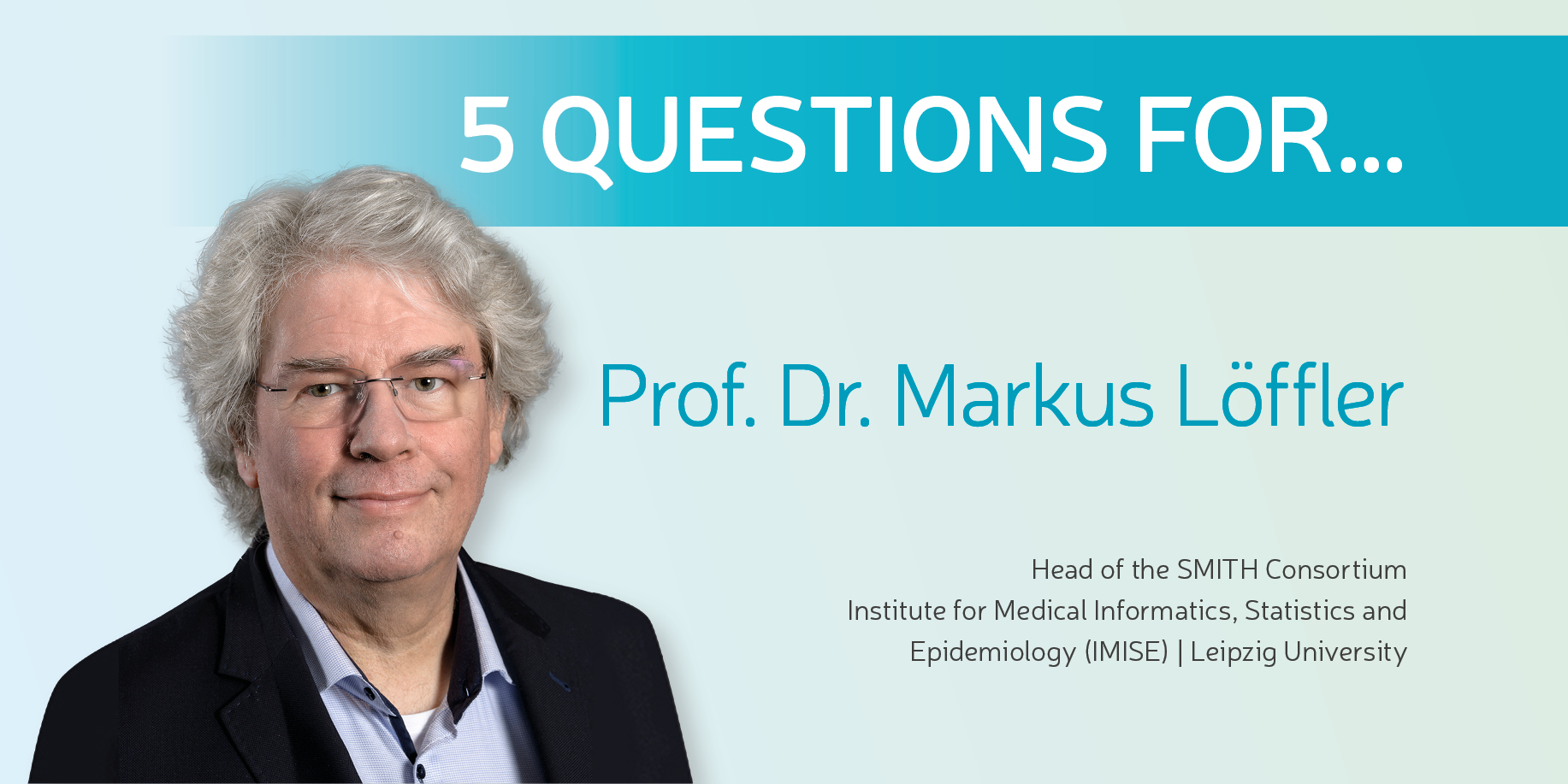
On World Boss Day: “Persuasiveness and forethought are the keys” | 5 Questions for… Consortium Leader Prof. Dr. Markus Löffler
Today is World Boss Day! This day is celebrated mainly in the USA, where employees show their appreciation to their bosses with greeting cards and gifts. Here in Germany, this holiday is less well known – however, we took this opportunity to talk to the head of our consortium, Prof. Dr. Markus Löffler.
The former director of the Institute for Medical Informatics, Statistics and Epidemiology at the Leipzig University studied medicine and physics to shape the field of “theoretical medicine”. He later specialized in biometric research. Since then, he has been intensively involved in statistical analysis and evaluation in medicine. As the leader of numerous large projects, he has had to prove his leadership skills on several occasions. In addition to leading the SMITH Consortium, Professor Löffler is the leader of the cross-consortium Use Case INTERPOLAR and deputy coordinator of the GeMTeX methodology platform. He describes his leadership style as “friendly, decisive, and persuasive”, and his motto as “thinking and acting with foresight”.
In the interview, Professor Löffler gives an insight into his daily life as a consortium leader and his plans for the SMITH Consortium in the coming years.
Why did you become consortium leader?
Professor Löffler: I have always been interested in opening up new sources of data, doing analyses that could not be done before, and enabling new study designs. So my motivation comes from the world of biostatistics and epidemiological research. When I heard that the Medical Informatics Initiative was being launched in Germany and that it was possible to apply, it became clear to me that there were opportunities here to obtain data from patient care and make it analyzable. As a result, I brought this opportunity to the attention of my dean at the time and the medical director of Leipzig University Medical Center and asked them to support this project. They found it very exciting and important and agreed. It was immediately clear that I should write the proposal. I had a lot of experience with proposals and had successfully led other consortia in areas such as sepsis, oncology and lung diseases. Later, as more partners joined, they all agreed. They knew I had experience in leading consortia, so the trust was there very quickly. I didn’t push to become a consortium leader –– it was just an incidental thing.
As you mentioned, you also manage other major projects. What motivates you to take on this responsibility?
Professor Löffler: I can’t really answer that. Obviously, I’m quite good at managing people and consortia. Sometimes it’s difficult, but it’s always gone very well with the medical informatics consortia. Maybe I have a knack for bringing people together. And that is the most important thing from my point of view: I always try to think one step ahead, so I always have another arrow in my quiver. Persuasion and foresight are the keys.
What exactly are your duties and responsibilities as consortium leader?
Professor Löffler: I have many tasks, especially of an organizational and administrative-technical nature. However, I have excellent support from the LIFE Management Cluster at the Medical Faculty of the Leipzig University, to which we have linked our medical informatics projects administratively. This is a really well-functioning team that manages everything well from an operational point of view. So I don’t have to worry much about the day-to-day operations. I see my main role as providing scientific leadership and understanding the many aspects of the interdisciplinary topics. I have to connect the different topics and keep track of where there is a need for coordination, where there are pitfalls, where there are risks to the project, or where there are special benefits that were not visible before. In summary, I see my main role as promoting innovation.
What challenges do you face in your role as consortium leader?
Professor Löffler: Let me put it very simply and figuratively: The main challenge is to always surf in front of the wave and not behind it. So that you are able to act in time for upcoming decisions and good new ideas and can look a little further into the future. If you’re always behind, you often lose the ability to act. I don’t like to do that. But sometimes you can’t help it, and then events overtake you and suddenly you’re behind the wave.
What are your plans for the SMITH Consortium in the coming years?
Professor Löffler: I think we have achieved a lot, but there is more to come. The main plan I see for SMITH is to make the Data Integration Centers of our ten partners, together with the Data Integration Centers of the other consortia, an indispensable part of data analysis in Germany. We have to convince clinical colleagues that the Data Integration Centers are useful for their work. On the one hand, they serve to optimize patient care, and on the other, they create the prerequisites for clinical studies that, for example, capture the reality of care. I hope that we will be able to demonstrate these possibilities with our projects, so that the Data Integration Centers in hospitals will become as indispensable as the coordination centers for clinical trials at the medical faculties. With the help of federal funds, almost 20 centers for clinical trials (ZKS) and coordination centers for clinical trials (KKS) were founded. All of them still exist. More have been added because many faculties have understood that without these centers, their scientists are missing out. My goal – and I agree with all the other consortium leaders – would be for the Data Integration Centers to have a similar status.
The work in the SMITH Consortium is important for the future of digital health care in Germany because…
Professor Löffler: …with this work we can to some extent overcome the digital underdevelopment in healthcare, open up new possibilities and become internationally compatible.

